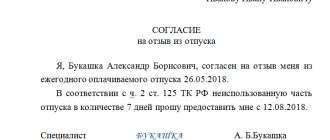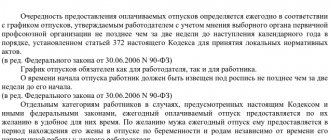What is unused vacation?
Where does unused vacation come from?
? According to the Labor Code of the Russian Federation, employers are required to annually allocate paid vacation days to their employees. There are 28 of them per year, which can be divided into periods of 14 days.
But employees do not always have time to use them for various reasons. The Labor Code provides for the possibility of transferring vacation days to the next year.
You can transfer your vacation to the next year if there are reasons not to go on vacation. But vacation days do not remain fireproof; there is a statute of limitations. And an example of calculating unused vacation will be relevant if an employee plans to add the days remaining from last year to a new vacation or quits and expects to receive financial compensation.
Articles on the topic (click to view)
- Fine for late payment of vacation pay
- What to do if your employer does not pay vacation pay
- How long after employment is vacation allowed?
- Is maternity leave taken into account when calculating pensions?
- Accounting for compensation for unused vacation
- Dismissal while on maternity leave
- Notice of granting leave to an employee: sample 2020
If an employee does not want to go on maternity leave
Maternity leave is the legal right of every working woman to prepare for the birth of a child in calm conditions, outside the work process. However, there are cases when employees of enterprises refuse to go on such leave within the time limits established by law.
According to the law, the employer has no grounds to force an employee to take advantage of the right to maternity leave. That is, if a woman has not written a corresponding statement, thereby expressing a desire to continue working, the employer cannot prevent her from doing so.
Maternity leave is a woman’s right, not her responsibility, so she herself has the right to determine when she is ready to use it.
At the same time, we must not forget that if a woman goes on maternity leave later than the date indicated on the sick leave, then its period automatically becomes shorter, which entails a reduction in the legal benefit for this circumstance.
Despite the fact that monitoring compliance with the right to leave by law falls on the shoulders of the employer, employees, due to any circumstances, may violate the management of the enterprise from fulfilling this obligation. In this case, the problem may have several solutions, however, they will all require bilateral negotiations and some kind of agreement.
How is vacation not taken off?
Regardless of any factors, vacation accrued over the past years will not be expired.
. The employer is obliged to act as a guarantor that if the employee did not take vacation in 2020, then it will not be lost. But this does not apply to every year. Transfer is possible for a maximum of one year. The number of days of unused vacation is transferred to 2020. The days can be used as time off or added to a new annual holiday.
The number of days of unused vacation is retained, even if the employee went on additional educational or maternity leave during the year. The right to rest according to the Labor Code of the Russian Federation is inviolable
, in any case, the unused part of the vacation is transferred to the next year.
What to do if an employee does not want to go on vacation
For the vast majority of employees, vacation time is a long-awaited and joyful period. The right to rest is guaranteed by the state and employers are obliged to regularly provide legal leave to subordinates. True, sometimes this norm is violated, and if the employer’s neglect of it can sometimes still be somehow explained, then cases when an employee, for some reason, does not want to go on vacation, are non-standard and not always explainable. However, regardless of the reason, an employee’s refusal to take leave for the management and HR department of an enterprise is always a headache.
Is it possible not to go on vacation?
The employee can reschedule vacation and continue working during the current year. But to completely refuse a vacation, compelling reasons are required, such as:
- the presence of urgent work that only this specialist can perform;
- insufficient number of employees for the vacation period;
- crisis in production;
- difficult financial condition of the company.
Expert opinion
Novikov Oleg Tarasovich
Legal consultant with 7 years of experience. Specializes in criminal law. Member of the Bar Association.
If the signed employment contract allows, then the employee may not take vacation this year on his own initiative, and not only for good reasons from management. Unused days also do not expire.
Unused vacation days calculator
To calculate the number of days of unused vacation, it makes sense to turn to a calculator, available even online. You can also count the days of unused vacation yourself. The formula for calculating compensation by day is simple:
- Multiply the number of months worked by 2.
- Subtract from the resulting number the number of days for which you went on vacation during the entire period of work.
- The remainder will be the number of unused days.
Calculating the vacation balance is relevant both if you want to take advantage of it, and if you leave the company to receive financial compensation.
Non-vacation leave - subtleties of legislation on this matter
People who are employed are often interested in the question of whether vacation time is lost or whether it can be used in the future. It is worth knowing the norms of the Labor Code in order to properly build relationships between a subordinate and a manager, including in matters of rest time. According to the Labor Code, workers have the right to rest. The period when the employee does not work but rests is paid. This right is reflected in legislation. In most cases, this period is 28 calendar days; there are other lengths of time.
Unused vacation – unused vacation days for one reason or another. This can be an extreme demand in the workplace. Perhaps the employee, on his own initiative, decided to go without vacation. The reason is not that significant.
Procedure for registering unused vacation period
It is necessary to record the vacation not taken off, otherwise it may burn out. HR department employees are required to deal with these issues. If the enterprise is not large, then perhaps the accounting department deals with such things.
The employee has the legal right to inform management of his intention. He can choose either to receive a cash payment or to rest for the prescribed period.
The next vacation is provided once a year. It is calculated after twelve months of work. The employee must submit a written application, after he has worked for 6 months at the enterprise.
By law, the manager must satisfy your right. If a person has worked for a calendar year, this means that he has unused regular vacation. In this case, leave is granted upon request. Management's arguments about production necessity and indispensability are unjustified.
The reality is somewhat different from the “letter of the law”. It is unlikely that anyone will conflict with management. In this case, you could lose your job. Under such circumstances, solutions are found that would satisfy each of the parties.
This is important to know: How vacation pay is paid in 2020: procedure and timing of issuance
The law stipulates that if an employee does not rest, he is entitled to monetary compensation. It may be required in some cases. There are certain conditions that indicate the protection of workers' rights. Laws are adopted taking into account that managers of large and small enterprises cannot mislead people and simply exploit them.
There are bodies whose responsibility is to monitor the process of compliance with the rule of law in organizations. The employer must monitor the health and rest of subordinates. If employees do not take rest for any reason, and there is a vacation debt, they are awarded compensation.
The nuances of sending an employee on vacation if he doesn’t want to
In rare cases, employers may have a question about how to send an employee on vacation if he does not want to rest. Quite often, you can encounter the opposite problem, if a person wants to take days off, but his superiors do not allow it. When we are talking about the legal right to leave, then such actions on the part of management can be considered unlawful. But what to do if an employee for some reason refuses to rest? Now let's figure out what this problem is, as well as how it can be solved.
Conditions for payment of compensation
Instead of non-vacation leave, upon dismissal, the employee is entitled to accrual of compensation payments. When drawing up the order, the administration indicates that there is unused vacation for several years. It comes in several types:
- The next one.
- Special.
- Additional, etc.
Expert opinion
Novikov Oleg Tarasovich
Legal consultant with 7 years of experience. Specializes in criminal law. Member of the Bar Association.
Is it possible to receive payment without leaving the company? Perhaps, if the employee rested for at least half of the required period. Only then is compensation paid. Does unused vacation expire? Unused vacation from previous years does not expire.
In accordance with Article TC No. 124, an employee has the right to use all accumulated vacation days for previous years with a particular employer. It is possible to add days to the current next vacation. This question arises often - if I didn’t take vacation over the past year, does my vacation expire? For example, if there are days left over from last year, they automatically transfer to the next year. Perhaps add 13 days to your next vacation. In case of dismissal, in accordance with Article No. 127 of the Labor Code, the employee has the right to:
- Receiving monetary compensation for unused vacation.
- Submitting an application for vacation with further dismissal (at one’s own request, if for other reasons it is not paid and vacation days are running out).
Unused vacation arrears expire in 2020
Do vacations from previous years expire? The answer to the question is unequivocal - no, both the unused vacation period in 2020 and in 2020 does not expire. Workers who, for various reasons, practically do not rest, accumulate debts on vacation days that are quite large.
This situation, as a rule, does not suit the employer. The following reasons:
- The labor inspectorate will be interested in the issue of inadequate rest for employees.
- For accumulated vacation days, compensation will have to be paid upon dismissal of an employee, on the basis of Labor Code Article No. 127. Therefore, managers offer employees all kinds of options for canceling vacation time for previous years.
Disposal options, advantages and disadvantages:
- The employee takes off the vacation period in parts or in full (TC Article No. 125). Receives proper rest, as well as payment (vacation pay).
- Sometimes management suggests dividing the period into short periods, mainly weekends. At the same time, the employer argues that this is a benefit for the employee, since he will receive greater material benefits. A certain amount (vacation pay) will be paid for a day off. So the vacation will be burned (debt on vacation days).
- The worst option is to take another vacation and continue working. The employee receives vacation pay, but loses his salary, since he is officially on vacation.
Important! The same rules apply to additional vacation days as to regular ones. Additional unused days can be used by adding them to the current, upcoming vacation. Or, upon dismissal, you will be paid compensation, in accordance with Article No. 127 of the Labor Code of the Russian Federation.
What to do with unused vacations
"HR service and personnel management of the enterprise", 2008, N 1
Question: Many employees of our organization have from 2 to 4 unused annual paid vacations. Can we give them leave in parts or should we give it all at once? Is it possible to replace part of the vacation with monetary compensation if the employee does not object and has submitted a written application to this effect?
Natalya Pozdnyakova, Chelyabinsk
Answer: Based on Art. 2 of the Labor Code of the Russian Federation, the basic principles of legal regulation of labor relations and other relations directly related to them include ensuring the right of each employee to rest, including limiting working hours, providing daily rest, weekends and non-working holidays, paid annual leave.
Article 114 of the Labor Code of the Russian Federation provides for the provision of annual leave to employees while maintaining their place of work (position) and average earnings. At the same time, the minimum duration of the main paid leave has been established - 28 calendar days (Article 115 of the Labor Code of the Russian Federation). Extended basic leave (more than 28 calendar days) is provided annually in order to guarantee employees longer rest, taking into account the nature and specifics of their work activity, working conditions, health, age and other circumstances. It is important to note that on the basis of Art. 120 of the Labor Code of the Russian Federation, the maximum limit of annual basic paid leave is not limited. Therefore, the parties to the employment contract can independently establish any duration of this leave by labor (collective) contract, agreements and other local regulations.
Paid leave must be provided to the employee every year (Article 122 of the Labor Code of the Russian Federation). In exceptional cases, when the provision of leave to an employee may adversely affect the normal course of work of the organization, it is allowed to transfer the leave to the next working year, but only with the consent of the employee (Article 124 of the Labor Code of the Russian Federation). In this case, the leave must be used no later than 12 months after the end of the working year for which it is granted.
Leave for the second and subsequent years of work can be granted at any time of the working year in accordance with the order of provision of annual paid leave established in the given organization. At the same time, it is prohibited not to provide employees with annual paid leave for two years in a row. A special category of workers (under the age of 18 and employed in work with harmful and (or) dangerous working conditions) must be provided with paid leave every year (Part 4 of Article 124 of the Labor Code of the Russian Federation).
For the purpose of rational use by employees of the days of annual paid leave due to them, as well as taking into account the needs of modern practice, Art. 126, which allows for the replacement of vacation with monetary compensation, but only in part and subject to certain conditions.
Firstly, the employer can replace with monetary compensation only that part of the vacation that exceeds 28 calendar days (the minimum duration of the main paid vacation). It should be borne in mind that when summing up annual paid leave or transferring annual paid leave to the next working year, only that part of each annual paid leave that exceeds 28 calendar days, or any number of days from this part, can be replaced with monetary compensation.
This is important to know: Order for replacement during vacation: sample 2020
Example. For example, an employee is granted vacation for 2 working years. The total duration of vacation is 56 calendar days. In this case, it is impossible to replace part of this leave with monetary compensation, since for each working year the duration of leave does not exceed 28 calendar days.
Secondly, the employer cannot independently initiate the replacement of part of the vacation with monetary compensation. For such a replacement, the employee’s own will is required, expressed in a written statement.
Thirdly, part 3 of Art. 126 of the Labor Code of the Russian Federation directly prohibits an employer from replacing vacation with monetary compensation for pregnant women and employees under the age of 18, as well as employees engaged in heavy work and work with harmful and (or) dangerous working conditions, even with the written consent of the above categories of workers.
This provision of the law is based on the main purpose (goal) of the annual main leave, as well as the general provisions of the Labor Code of the Russian Federation regulating the rules for granting annual leave.
The provision of accumulated vacations can be done at the mutual discretion of the parties to the employment contract or an individual vacation schedule can be drawn up.
An employee does not want to go on vacation: options for solving the problem
If an employee shows persistence and does not want to leave his workplace at the time planned in accordance with the vacation schedule, the organization’s management has the right to go in several directions.
- You can reschedule your vacation to another time , but only if the employee has valid reasons with an evidentiary documentary basis. This option is a compromise and the most gentle for both parties. In addition, the employer is obliged to postpone vacation days if the employee did not bother to notify the employee about the vacation one day of the week before it in writing against signature, and also if he was paid vacation pay later than the deadline established by law. However, it is worth remembering that transferring vacation will not be possible if the employee has not gone on vacation for more than two years in a row.
Attention! If an employee refuses to go on vacation and no dissuasive measures apply to him, the employer has every right to bring him to disciplinary action for ignoring the manager’s order.
- An employer may provide a subordinate with weekend leave . By law, not only weekdays, but also weekends are considered calendar vacation, with the exception of holidays, non-working days, which are not considered vacation and are not paid. In other words, if an employee has expressed a desire to have leave on weekends, then the employer can meet him halfway and count Saturdays and Sundays as leave, which will need to be paid. Here, only one important condition must be met: vacation can be divided into an unlimited number of periods, the main thing is that one of them lasts two weeks.
- Another option used is to fire the employee and then hire him back into the company. This method will allow the employer to avoid possible problems during inspections by the labor inspectorate, as well as to respect the rights of all parties to the labor process. The positive side here is the fact that neither the employee nor the employer has to justify their decision in any way: the practice is such that the restoration of employees to their previous places of work has become not so rare, one might even say, a common occurrence. But you need to remember that for unspent vacation, the employee is entitled to monetary compensation, which does not depend on the grounds on which the employment relationship was terminated, therefore, upon dismissal, the employee will have to pay this money in full and without fail.
What to do with accumulated unused vacations?
The reasons why an employee does not use vacation in the next year can be different: production necessity, the desire of the employee himself.
According to the general rule established by Article 122 of the Labor Code, the employer is annually obliged to provide employees with paid leave. In exceptional cases, vacation may be postponed to the next working year, but this requires the simultaneous existence of the following conditions:
— granting leave to an employee in the current working year may adversely affect the normal course of work of the organization;
— the employee agrees to postpone the vacation (part three of Article 124 of the Labor Code of the Russian Federation).
Labor legislation prohibits failure to provide an employee with annual leave for two consecutive years.
So, if due to production needs (with the employee’s consent) the employee is not granted leave in the current working year, the employee must take the vacation within 12 months after the end of the working year.
For example, the employee’s working year is from June 1, 2013 to May 31, 2014. Due to production needs, the employee was not provided with leave this year. The employee must use vacation for this working year before May 31, 2020.
Registration of transfer of vacation to the next year
So, the employer, due to production needs, decided to postpone the employee’s vacation to the next year. The employee agrees with this decision.
Please note that labor legislation does not require the employee’s consent to reschedule leave to be formalized in writing. However, in order to avoid conflict situations, the personnel officer may ask the employee to confirm in writing his consent to postpone the vacation to the next year.
Having received such consent, the employer issues an order to transfer the employee’s vacation to the next working year. If the vacation is postponed to the next calendar year, the new vacation date will need to be reflected in the vacation schedule, which will be drawn up later, for the next calendar year.
Expert opinion
Novikov Oleg Tarasovich
Legal consultant with 7 years of experience. Specializes in criminal law. Member of the Bar Association.
Note that, according to Rostrud, it is possible to take into account unused vacations in the vacation schedule for the next calendar year. Or ask the employee to write an application for unused vacation in the current year.
If you have accumulated a lot of unused vacations
It is quite common for employees to accumulate vacation leave over several years. Accordingly, the employer is faced with the question: what to do with the accumulated vacation time?
Labor legislation gives the only answer to this question: in order to avoid administrative liability for violation of labor laws, employees must be provided with all accumulated unused vacation days.
Please note that the employer is obliged to provide the employee with all unused vacation days, and upon dismissal, pay compensation for all “unused” vacation days. Regardless of the period during which these vacations are accumulated, they do not expire.
Compensation for unused vacation
Many employees mistakenly believe that if they do not take vacation this year, the employer is obliged to pay them compensation for unused vacation. The personnel employee must explain to employees: compensation for unused vacations is paid only upon dismissal (Article 127 of the Labor Code of the Russian Federation). If the employment relationship between the employee and the employer does not terminate, as a general rule it is impossible to pay compensation for “non-time off” vacations.
An employer can pay compensation for unused vacation only if the employee’s vacation duration exceeds 28 calendar days. Moreover, compensation can be paid only for days exceeding standard leave.
Please note that the employer does not have the right to independently decide to replace vacation days with monetary compensation. He can do this only if the employee submits a written application for payment of monetary compensation instead of vacation days.
Example. The employee is given an irregular working day and given additional leave of three calendar days. The total duration of an employee's annual leave is 31 calendar days. At the written request of the employee, the employer may replace three days of vacation with monetary compensation.
Please note that in order to replace vacation with monetary compensation, unused annual vacations are not summed up. In other words, compensation can only be paid for those vacation days that exceed 28 calendar days of each annual vacation.
For example, the duration of an employee’s vacation is 28 calendar days. The employee has not used vacation for two years and has accumulated 56 days of vacation. In this situation, it is impossible to replace vacation with monetary compensation, since the duration of vacation for each year does not exceed 28 calendar days.
Keep in mind that for certain categories of employees, replacing vacation with monetary compensation is generally prohibited. Regardless of the duration of the main and additional leave, it cannot be replaced with compensation:
Expert opinion
Novikov Oleg Tarasovich
Legal consultant with 7 years of experience. Specializes in criminal law. Member of the Bar Association.
And employees employed in jobs with harmful or dangerous working conditions are prohibited from paying compensation in exchange for additional leave (part three of Article 126 of the Labor Code of the Russian Federation).
When an employee has not used vacation for a long time and providing a fairly long rest period is impossible from a practical point of view, many employers deal with the current situation in the following way. The employee is offered to terminate the employment contract. At the same time, he is paid compensation for all unused vacations and the next day after dismissal, the employee is rehired.
This is important to know: Is financial assistance included in the calculation of vacation pay?
Let us note that despite the fact that in this situation there are no violations of labor legislation, to apply this method it is necessary that the employee and the employer have a trusting relationship.
Responsibility for not providing leave
Keep in mind that if long-term work without vacation is not an isolated case in the organization, but an accepted practice, the labor inspector has the right to regard the failure to provide vacation to each employee as a separate violation. Accordingly, the amount of the fine will depend on how many employees did not use their vacation in a timely manner (Resolution of the Supreme Court of the Russian Federation of August 15, 2014 No. 60-AD14-11).
What to do if an employee refuses to go on vacation according to the vacation schedule
The responsibility of any employer is to provide the employee with regular paid leave. There are times when an employee, for whatever reason, refuses to go on vacation. Does the employee have the right to make such decisions? What consequences can a decision made by an employee have for an employer? Answers to these questions can be found in this article.
The vacation schedule is one of the most important documents in personnel records management, which allows you to qualitatively regulate the vacation periods of employees taking into account the needs and capabilities of the organization, while observing the norms of labor legislation regarding the right of employees to annual rest..
There must be a vacation schedule where there is a team. The legal form in this case does not matter. This can be a legal entity (organization) or an individual (individual entrepreneur).
The vacation schedule is a unified form No. T-7, approved by Decree of the State Statistics Committee of the Russian Federation of January 5, 2004 No. 1, but in reality the organization has the right to independently decide to fill out the specified form No. T-7 or develop its own document form adapted for a specific organization .
Can a missed vacation be burned out?
The question of whether unused vacation for previous periods is forfeited appeared with the ratification of the ILO Convention in 2010. Paragraph 9 of this normative act establishes that the minimum part of the vacation lasting 14 days must be used within 1 year , and the remaining days - no later than 18 months after the close of the working year for which it is provided.
Over the past years
Due to the erroneous interpretation by some experts of Clause 9 of the ILO Convention, many began to be afraid of the possibility of “burning out” unused vacation days. But this rule does not imply the loss of the accumulated period , but only notes when the company must provide the employee with those days that were delayed.
Russian legislation establishes a different period. In accordance with Article 124 of the Labor Code, transfer of vacation is possible either within one working year or to the next. An obligation is established not to interfere with the provision of holidays for two consecutive years.
At the same time, this condition and the Labor Code in general do not indicate that if a break for restoration was not provided for two years, it must be canceled. Article 124 of the Labor Code obliges the employer to comply with the frequency of provision and sets maximum deadlines . For violating them, the company will face a fine.
Unused vacation from previous years does not expire, but continues to accumulate.
At the same time, if no vacation was taken out in the current period, next year the days are first provided from the accumulated ones, only after that the use of vacations of a different period begins.
Upon dismissal
The dismissal of an employee from the organization is also not grounds for losing unused days of vacation. Article 127 of the Labor Code provides that in the event of termination of an employment contract, a citizen is paid monetary compensation for periods of rest that he did not have time to use. It also provides for the right to take these days with subsequent dismissal.
When going on maternity leave
The onset of a break for rest due to pregnancy or child care does not serve as a basis for “burning out” the accumulated days. While waiting for the baby, the main vacation continues to accumulate, but in the case of looking after a child under 3 years of age, the length of service required to form vacations is lost (Article 121 of the Labor Code).
Women are given the opportunity to use all remaining days of rest before taking a pregnancy break, or immediately after it (Article 122 of the Labor Code).
Is it possible to refuse a vacation altogether?
However, there are cases when employees do not want to go on vacation of their own free will. What should the employer do in this case?
Recommendations
The order of provision of paid vacations is determined annually in accordance with the vacation schedule. The specified schedule is mandatory for both the employer and the employee (Article 123 of the Labor Code of the Russian Federation).
Thus, an employee is obliged to go on vacation in accordance with the schedule if:
- does not agree on its transfer with the employer;
- there have not been cases in which such a transfer is mandatory (Article 124 of the Labor Code of the Russian Federation).
In accordance with Part 3 of Art. 123 of the Labor Code of the Russian Federation, the employer must notify the employee about the start time of the vacation against signature no later than two weeks before its start.
If an employee refuses to sign a notice of leave, then the employer should draw up a report about this. This must be done in writing in the presence of two witnesses who will sign the specified act. Based on this act, the employer will be able to impose a disciplinary sanction on the employee for refusing leave in accordance with Art. 192 - 193 Labor Code of the Russian Federation. The possibility of imposing a penalty is explained as follows.
A disciplinary sanction is imposed on an employee who, through his own fault, did not fulfill or improperly performed his labor duties (Part 1 of Article 192 of the Labor Code of the Russian Federation). One of the employee’s responsibilities is to comply with internal labor regulations, which, in particular, regulate work and rest hours (paragraph 3, part 2, article 21 and part 4, article 189 of the Labor Code of the Russian Federation).
If an employee signed a notice about the start of vacation, but still went to work on his own initiative, then the employer should notify him that the time he worked will not be paid. This is related to the following.
Firstly, vacation is one of the types of rest time (Article 107 of the Labor Code of the Russian Federation). In this case, rest time is understood as the time during which the employee is free from performing work duties and which he can use at his own discretion (Article 106 of the Labor Code of the Russian Federation). It turns out that the employer relieved the employee of his work duties, which is documented in the form of a notice. And the employee disposed of his vacation, using it for work of his own free will. That is, the employer did not involve the employee in work on his own initiative; on the contrary, he did everything in his power to send the employee on vacation.
Secondly, during the vacation the employee retains his average earnings, that is, vacation pay is paid (Article 114 of the Labor Code of the Russian Federation). And the preservation of average earnings with the simultaneous payment of wages is not provided for by the Labor Code of the Russian Federation.
← all news
Why you shouldn't miss your vacation
The main burden for failure to comply with the procedure for providing time for recuperation falls on the company. If an employee misses a vacation or does not take it on time, the employer may be held liable under Article 5.27 of the Code of Administrative Offenses of the Russian Federation. Therefore, the responsible employee of the organization needs to monitor the used periods of full-time employees.
The employee should be afraid that the company will be declared bankrupt and will experience severe financial problems, due to which he will have to seek leave or compensation upon dismissal through the court and the Labor Inspectorate. The administration may also force you to book missed periods on weekends, thereby depriving you of additional rest .
Solution
Most often, if an employee does not want to go on vacation, there is a specific reason for this. It may happen that he is not satisfied with the date assigned by the manager. If he has good reasons with an evidentiary base, then he can postpone the holiday period to another time. This must be done if the organization has not notified about time off two weeks in advance. The same thing will need to be done if vacation pay was paid later than expected. But let us remind you that a transfer is impossible for a person who has not rested for more than two years.
Is it possible to postpone my vacation to next year?
The employee is granted leave on the dates specified in the vacation schedule, which is approved by the employer (Article 123 of the Labor Code). In general, the company's administration is guided in its preparation only by the conditions of production necessity, but in some situations it is obliged to take into account the wishes of the worker.
Due to the fact that the rest schedule is drawn up in December of the current year for the next year, it is impossible to plan in advance for the occurrence of unplanned circumstances for an employee or the occurrence of emergency problems at work. Therefore, the state enshrined in Article 124 of the Labor Code the possibility of transferring holidays to another period.
If the situation refers to one of the following, then the employer must agree on new weekend dates with the vacationer:
- Illness of an employee during the period of planned rest.
- Performing government duties at this time.
- Untimely paid vacation pay or late notification of the start of vacation.
If an employee needs to change the vacation time for personal reasons, this is possible if he receives the employer’s consent.
The state allows a company in rare situations to postpone the period of annual paid leave when production conditions do not make it possible to carry out what was planned in the schedule.
In this situation, the company administration must obtain the worker’s consent and also provide him with the right to rest for the next working year (but no later than 1 year from the end of the current one). Persons under 18 years of age and those employed in hazardous work cannot but be granted leave during the working year.
Can an employee refuse vacation?
So what to do if an employee does not go on vacation? First of all, when drawing up a schedule, as a rule, in December, it is necessary to collect memos from senior employees, which indicate the periods in which they want to rest, taking into account that one of the parts of the vacation must be at least 14 calendar days. Then it is necessary to issue an order on time, no later than two weeks before the start of the vacation, and familiarize the employee with it against signature. The accounting department must pay for the vacation no later than three days before it starts. Once all the necessary formalities have been completed, an employee who does not comply with the vacation schedule can be subject to disciplinary action for failure to comply with the manager's order. If for some reason an employee was not included in the vacation schedule, he cannot be deprived of his right to a well-deserved rest. In this case, leave is granted by agreement between the employee and the employer based on the employee’s personal application. At the time of preparation, the personnel officer forgot to include it in the schedule. Many personnel officers in such a situation draw up a new schedule. However, there is no need to redo and sign the document again. Firstly, a significant part of the information in it is indicated by hand in columns 7-9 and when rewriting it you can make mistakes again, and secondly, in many organizations the document is supplemented with a column for familiarizing employees with the vacation schedule, and collecting all the signatures again is not an easy task . So how do you make corrections? A correction in the primary accounting document must contain the date the adjustments were made, as well as the signatures of the persons who drew up the document in which they were made, indicating their surnames and initials or other details necessary to identify these persons 2. There are employers who establish in the internal labor rules schedule, it is mandatory to divide the vacation into parts, for example, one of which is 14 days and two of which are seven days each. Based on this, HR specialists draw up a vacation schedule in which all employees’ vacations are divided into parts, believing that the legal requirements are met. This opinion is erroneous and such agreements have no legal force, since they worsen the situation of workers in comparison with the labor legislation of Art. The vacation can be divided into parts by agreement of the parties when drawing up a schedule for the next year. In order for the division to be legal, it must be formalized in the form of an application if it is an employee initiative or a notification, see. These documents must be signed by both parties: The employer does not have the right to refuse to transfer vacation to such an employee. Both parties must comply with the provisions of approved local regulations. For violation of this requirement, administrative liability is provided for the employer, and disciplinary liability for the employee. Natalya KORZUKOVA, Director of Human Resources and Administrative Affairs, Monsoon Accessorize Moscow: For the division to be legal, it must be formalized in the form of a statement if this is the desire of the employee or a notification if this initiative came from the employer Art. Approved by the resolution of the State Statistics Committee of Russia dated January 5, CBR rates for USD 59, 13.3 kopecks. EUR 69, 3.7 kopecks. The vacation date was postponed, but was not reflected in the schedule. The vacation schedule is approved no later than two weeks before the start of the calendar year. The employer refuses to postpone the vacation, although he is obliged to. Some employees have the right to receive annual paid leave at a time convenient for them. For example, these include: Example An employee has an accident and breaks his leg five days before the start of his vacation. To reschedule your vacation you need to: Remember the main thing Experts who took part in the preparation of the material noted: I got a job. In general, the point is that as the personnel officer decides, then my vacation will be, and they will only show me the approved schedule. Are the actions of the personnel officer correct? The procedure for granting annual paid leave. Paid leave must be provided to the employee annually. The right to use vacation for the first year of work arises for the employee after six months of continuous work with this employer. By agreement of the parties, paid leave may be granted to the employee before the expiration of six months.
Vacation for the second and subsequent years of work can be granted at any time of the working year in accordance with the order of provision of annual paid vacations established by this employer 0 0. If you register, you will be able to receive new comments by e-mail. Latest articles on the topic: We keep timesheets correctly. Expenses for fitness and sports: On the provision of additional leave to a medical worker of the medical unit of the Federal Penitentiary Service. Labor costs: Summarized accounting of working hours 5 How to send an employee on a business trip 1 New songs about the old: There is a reliable method and it already works How not to feed your savings to inflation. The dollar exchange rate for tomorrow has not yet been announced, but is already known. Keep your finger on the pulse of the purse! Hot news Selected articles Important documents Current topics Currency rates for tomorrow. About the project Contacts Authors Archive Advertising on the site. Newsletter Twitter Facebook VKontakte RSS. Sberometer Financial analysis and IFRS Financial analysis Reporting according to IFRS Accounting policy. We are discussing hot news, waiting for your opinion! Resolution of the State Statistics Committee of Russia dated January 5. How to find out the dollar exchange rate in the exchange office an hour earlier? How not to feed your savings to inflation Read the advice of a professional The dollar exchange rate for tomorrow has not yet been announced, but is already known Keep your finger on the pulse of your wallet!
Vacation schedule: working on mistakes
Poem about September 1st grade
New rules for storing hunting weapons at home 2017
Vote:
Dixit board game rules
History is very important
RFPL play-offs 2020 results
Cervical erosion treatment with suppositories
An employee does not want to go on vacation - the right decisions
Transfer rules
Advantages of pricing methods
Africa industry map
If the employee does not want to go on vacation
Word composition tasks
Results of elections to the Pushkino Public Chamber
How to plant a floribunda rose in spring
The employee's right to annual paid leave is established by law. If the employer refuses to exercise this right, then such actions of the employer can be challenged in court. But what about the opposite situation: when an employee does not want to go on annual leave? Can an employer force an employee to take a vacation?
To answer this question, you need to understand what annual leave is and what the procedure for providing it is. Annual paid leave is the rest time that an employee is entitled to receive every year, and lasting at least 28 days.
The employer includes the vacations of all employees in the vacation schedule for the year. Typically, this schedule is created two weeks before the start of the year for which it is being prepared. When determining who will go on vacation and when, the employer is not obliged to take into account the wishes of the employees . There are exceptions: the employer must take into account the wishes of such categories of employees as women with children under 14 years of age, parents of large families, disabled people, etc.
Before sending another employee on vacation, the employer is obliged to notify him in writing about the upcoming vacation against signature 14 days before it begins. In addition, an order is issued to grant the employee leave, which the employee also reads against signature.










